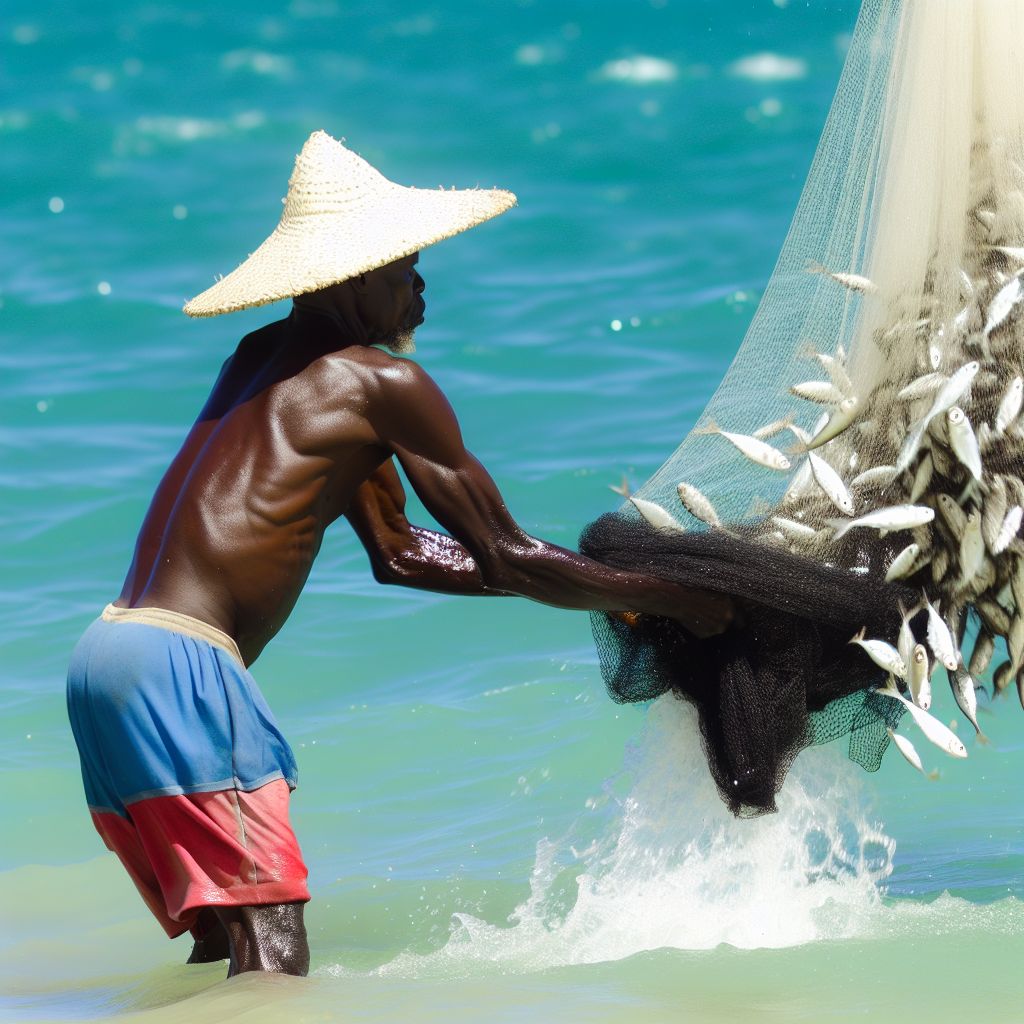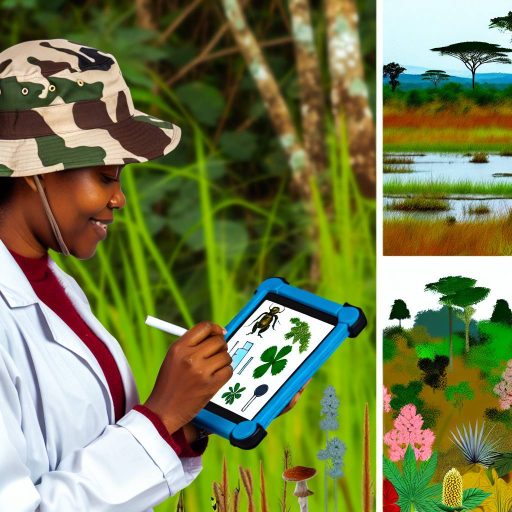Introduction:
Fisheries play a crucial role in the economy of Nigeria.
They provide employment and a significant source of protein for the populace.
However, the sector is plagued by numerous challenges such as overfishing.
Illegal fishing practices, pollution, and outdated infrastructure also contribute to these challenges.
As such, this blog post aims to explore the challenges facing the Nigerian fisheries sector.
It will propose sustainable solutions to address these issues.
The goal is to ensure the long-term viability of the industry.
Historical Overview of Fisheries in Nigeria
Over the years, the fisheries industry in Nigeria has undergone significant transformations.
This has shaped the nation’s food security and economic growth.
Understanding the historical evolution of this sector provides insight into its current challenges and potential solutions.
The Evolution of the Fisheries Industry in Nigeria
- Nigeria’s fisheries industry dates back to ancient times, with fishing as a primary source of sustenance for communities along the coast and inland water bodies.
- Colonial influence brought about changes in fishing practices, introducing modern techniques and technologies to increase productivity.
- Post-independence, Nigeria saw a rapid expansion of the fisheries sector, fueled by growing demand for fish products both locally and internationally.
Significance of Fisheries for Food Security and Economic Growth
- Fisheries play a crucial role in meeting the protein needs of Nigeria’s growing population, particularly in rural areas where access to other sources of protein is limited.
- The fisheries industry contributes significantly to the nation’s economy through job creation, income generation, and export revenue from fish products.
- Moreover, fish is a staple food in Nigeria, and the availability of affordable fish products is essential for ensuring food security and nutrition for all citizens.
Traditional Fishing Practices in Different Regions of Nigeria
- Across various regions of Nigeria, traditional fishing practices reflect the diverse cultures and environments that shape fishing activities.
- Coastal communities utilize artisanal fishing methods such as canoe fishing, beach seining, and gillnetting to catch a variety of fish species.
- Inland regions rely on techniques like trap fishing, hook and line fishing, and fish traps to harvest fish from rivers, lakes, and reservoirs.
As Nigeria’s fisheries sector continues to evolve, it is essential to preserve traditional knowledge and practices.
Embracing sustainable and innovative approaches will help address the challenges facing the industry.
Current challenges facing Nigerian fisheries:
Overfishing has become a significant issue in Nigerian waters.
It has led to the decline in fish populations.
This threatens the sustainability of the fisheries industry.
Fish stocks are being harvested at a rate that exceeds their natural reproduction capacity.
This results in a decline in fish populations and biodiversity.
Pollution from industrial activities, agricultural runoff, and oil spills has contaminated water bodies in Nigeria.
This pollution affects the health of fish populations and their habitats.
It degrades water quality and destroys essential breeding grounds for fish.
This further exacerbates the decline in fish populations.
The lack of adequate infrastructure hinders the efficient distribution of fish products.
Cold storage facilities, processing plants, and transportation networks are inadequate.
Additionally, the absence of modern technology for fishing and aquaculture limits productivity.
This limits the industry’s competitiveness on a global scale.
Nigeria’s fisheries sector suffers from a weak regulatory framework and inadequate enforcement.
This creates loopholes for illegal fishing practices and non-compliance with standards.
Addressing these challenges is crucial for the sustainable development of Nigerian fisheries.
It is also essential for the preservation of marine ecosystems for future generations.
Learn More: How to Become an Environmental Management Technologist
Socio-economic impacts of challenges in Nigerian fisheries:
Effect on livelihoods of fishermen and coastal communities
The challenges in Nigerian fisheries have a direct impact on the livelihoods of fishermen and coastal communities.
Fishermen rely on fishing as their primary source of income, and any decline in fish population affects their ability to earn a living.
This leads to financial instability and poverty among the fishing communities.
Coastal communities that depend on fish for sustenance also suffer as their main source of protein is compromised.
The lack of income and food security can have long-lasting effects on the overall well-being of these communities.
Decline in fish production and income
One of the major challenges facing Nigerian fisheries is the decline in fish production.
This decline is due to overfishing, pollution, habitat destruction, and climate change.
As fish populations dwindle, fishermen struggle to catch enough fish to meet market demands.
This results in a drop in income for fishermen and a decrease in the availability of fish for consumers.
The decline in fish production not only impacts the livelihoods of fishermen but also the economy as a whole.
Transform Your Career with Expert Guidance
Get personalized mentorship consulting that’s tailored to your unique path. Our expert advice is actionable and exclusive.
Get StartedFood security implications for the Nigerian population
The challenges in Nigerian fisheries have severe implications for food security in the country.
Fish is a major source of protein for the Nigerian population, especially for coastal communities.
A decline in fish production means a reduction in the availability of this essential protein source.
This can lead to malnutrition, especially among vulnerable populations such as children and pregnant women.
Food insecurity resulting from challenges in fisheries can have dire consequences for public health and well-being.
Increased reliance on imported fish products
Due to the decline in fish production in Nigeria, there is an increased reliance on imported fish products.
The country now depends on foreign sources to meet its fish demand, leading to a drain on foreign exchange reserves.
The importation of fish products also raises concerns about quality control and food safety.
This increased reliance on imports further strains the economy and exacerbates the challenges faced by Nigerian fisheries.
Overall, the socio-economic impacts of the challenges in Nigerian fisheries are profound and require urgent attention.
Find Out More: Challenges Facing Fisheries in Nigeria
Environmental sustainability in fisheries:
Importance of sustainable fishing practices
Conservation and management strategies
Role of aquaculture in reducing pressure on wild fish stocks
When it comes to Nigerian fisheries, environmental sustainability is crucial in ensuring the long-term viability of the sector.
Sustainable fishing practices are essential not only for the health of fish populations but also for the overall health of marine ecosystems.
One of the primary reasons why sustainable fishing practices are important is to prevent overfishing.
Overfishing occurs when fish are harvested at a rate that exceeds their ability to reproduce, leading to a decline in fish populations.
By implementing sustainable fishing practices, such as setting catch limits and implementing size restrictions, we can ensure that fish populations remain healthy and abundant.
Conservation and management strategies play a key role in promoting environmental sustainability in fisheries.
These strategies involve a combination of regulations, monitoring, and enforcement to ensure that fish populations are not depleted beyond sustainable levels.
For example, setting up marine protected areas where fishing is restricted can help to protect vulnerable species and habitats.
Additionally, sustainable fisheries management involves collaborating with local communities and stakeholders to develop strategies that take into account both social and ecological factors.
By involving local communities in the decision-making process, we can ensure that fishing practices are sustainable and aligned with the needs of the community.
Aquaculture also plays a crucial role in reducing pressure on wild fish stocks.
By farming fish in controlled environments, we can alleviate the demand for wild-caught fish and reduce the impact of fishing on marine ecosystems.
Aquaculture can also help to provide a sustainable source of seafood to meet the growing demand for fish products.
Environmental sustainability in fisheries is essential for the long-term health and productivity of marine ecosystems.
By implementing sustainable fishing practices, conservation and management strategies, and promoting the role of aquaculture, we can ensure that Nigerian fisheries remain vibrant and productive for future generations.
Explore Further: Innovations in Nigeria’s Environmental Technology

Government Interventions and Policies
One of the critical factors in the Nigerian fisheries sector is the government’s interventions and policies.
Let’s take a closer look at the existing policies, evaluate their effectiveness, and provide recommendations for improvement.
Overview of Existing Policies and Regulations in Nigeria
- The Nigerian government has implemented several policies and regulations to govern the fisheries sector.
- These policies aim to promote sustainable fishing practices, protect marine resources, and boost the economic growth of the sector.
- Some of the key regulations include licensing requirements for fishers, restrictions on fishing methods, and rules on fishing quotas.
- Additionally, there are regulations on fish processing, storage, and transportation to ensure food safety standards are met.
Evaluation of the Effectiveness of Government Interventions
- Despite the presence of regulations, enforcement of these policies remains a challenge in Nigeria.
- There are instances of illegal fishing activities, overfishing, and lack of compliance with licensing requirements.
- The lack of monitoring and surveillance infrastructure makes it difficult to control and regulate the fisheries sector effectively.
- Furthermore, corruption and lack of transparency in governance hinder the successful implementation of policies.
Recommendations for Improving Governance and Enforcement in the Fisheries Sector
- Enhance monitoring and surveillance capabilities through the use of technology such as GPS tracking systems.
- Invest in training and capacity building for fisheries officials to improve enforcement of regulations.
- Strengthen collaboration between agencies responsible for fisheries management to streamline governance and enforcement efforts.
- Implement a transparent and accountable system for issuing fishing licenses and permits to reduce corruption in the sector.
- Engage local fishing communities in decision-making processes to promote sustainable fishing practices and ensure their participation in governance.
- Offer incentives for compliance with regulations and penalties for violations to create a culture of accountability among fishers and stakeholders.
Effective governance and enforcement of policies are essential for the sustainable development of the Nigerian fisheries sector.
By addressing the challenges and implementing the recommendations provided, the government can improve the management of marine resources, promote economic growth, and ensure food security for the nation.
You Might Also Like: Challenges in Environmental Management Tech in Nigeria
Private Sector Initiatives and Partnerships
Private sector plays a crucial role in promoting sustainable fisheries by investing in technology, research, and conservation efforts.
Role of Private Sector in Promoting Sustainable Fisheries
The private sector can contribute to sustainable fisheries by adopting eco-friendly practices, supporting scientific research, and investing in capacity building.
Private companies can also help in promoting responsible fishing practices, monitoring compliance with regulations, and supporting communities dependent on fishing.
Examples of Successful Collaborations
There are numerous successful collaborations between the government, NGOs, and private companies in promoting sustainable fisheries.
For example, a partnership between a fishing company, a local NGO, and the government led to the establishment of a marine protected area.
Another successful collaboration involved a seafood processing company working with local communities to implement sustainable fishing practices.
Importance of Corporate Social Responsibility
Corporate social responsibility (CSR) is vital in fisheries management as it ensures that private companies operate ethically and sustainably.
By supporting community development projects, promoting environmental conservation, and engaging in transparent practices, companies can contribute to fisheries sustainability.
CSR activities can include sponsoring education programs for fishermen, implementing waste management solutions, and supporting marine conservation projects.
Private sector initiatives and partnerships are essential in promoting sustainable fisheries and ensuring the long-term health of marine ecosystems.
Companies that prioritize corporate social responsibility can make a significant impact on sustainable fisheries management.
Challenges Facing Nigerian Fisheries
Recap of the challenges faced by Nigerian fisheries:
Nigerian fisheries are plagued by issues such as overfishing.
Illegal fishing practices impact local populations negatively.
Pollution endangers aquatic life and ecosystems.
Lack of infrastructure limits effective fish management.
Poor regulatory framework exacerbates these issues.
Call to action for stakeholders to work together towards sustainable solutions:
It is imperative for all stakeholders to collaborate together.
Government agencies must enforce effective regulations.
Fishermen should adopt sustainable fishing practices.
Environmental organizations can assist in awareness efforts.
Hope for a brighter future for Nigerian fisheries through collaboration and innovation:
Concerted efforts can rejuvenate the fisheries industry.
Innovation in technology will improve fishing practices.
Management strategies can enhance sustainability overall.
Growth in this sector can benefit local economies.
By working together, a sustainable future is achievable.
Additional Resources
Coastal lagoons of West Africa: a scoping study of environmental …
The impact of flooding on Nigeria’s sustainable development goals …




